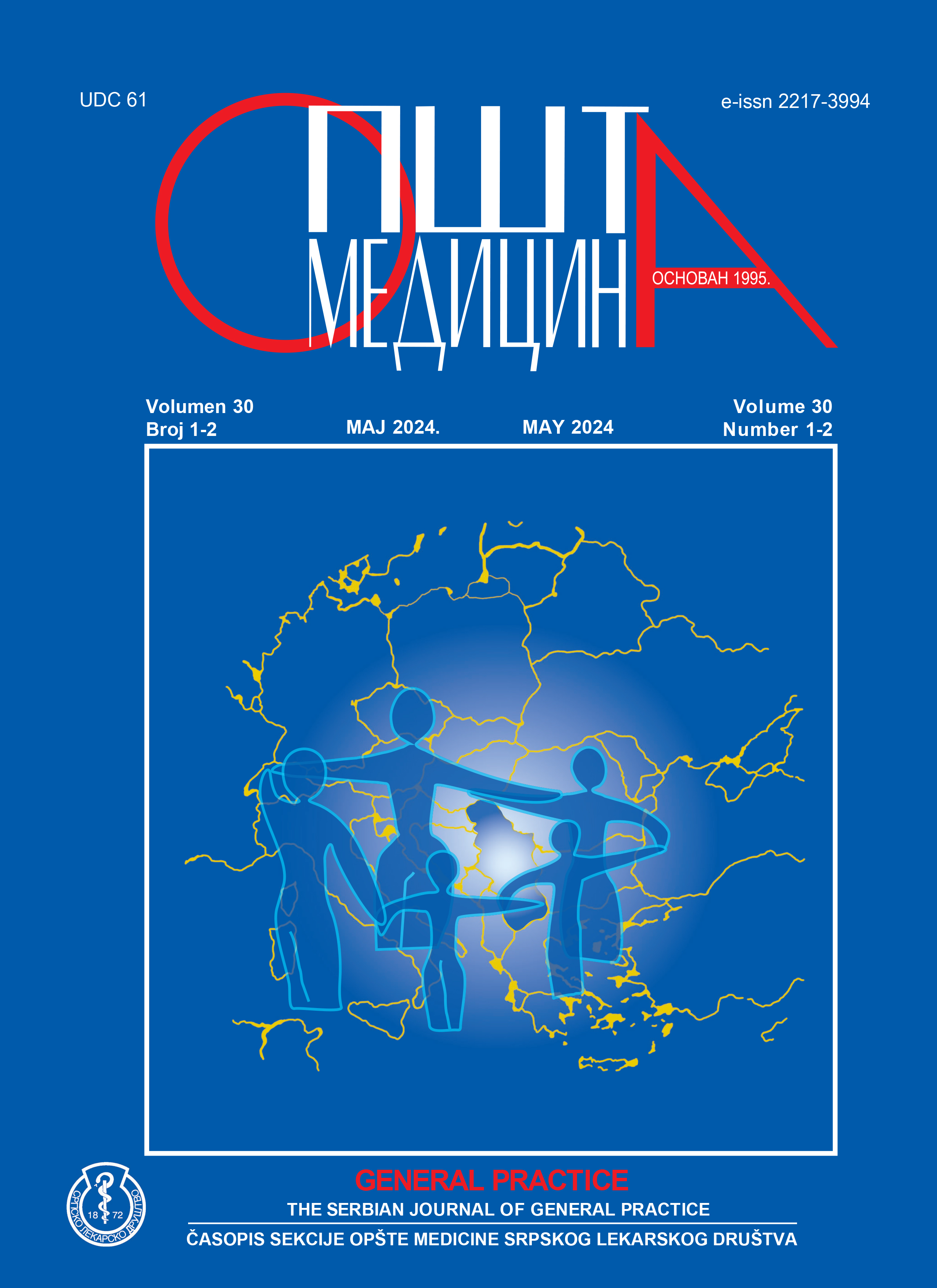Značaj ultrasonografije u praćenju multiplih fibroadenoma dojke
Sažetak
Uvod: Redovni ultrazvučni pregledi pomažu kod ranog
otkrivanja i praćenja raznih oboljenja. Ultrasonografija (US)
je od izuzetnog dijagnostičkog značaja mamografski „guste
dojke“ sa dominacijom glandularnog tkiva, dok je kod tzv.
„masnih dojki“ manje pouzdana. Koristi se da odredi solidnu
ili cističnu prirodu lezije, često i tkivnu karakterizaciju, a doplerskom
tehnikom i vaskularizaciju promene. Fibroadenomi
su najzastupljeniji benigni tumori dojke žena svih uzrasta do
menopauze, sa najvećom učestalošću između 15 i 25 godine
života. Na US nalazu vidi se oštro ograničena, ređe kružna
ili lobulirana hipoehogena promena, glatkih i ravnih kontura
ujednačenih odjeka sa posteriornim pojačanjem i rubnim slabljenjem
odjeka.
Prikaz slučaja: U radu je prikazana pacijentkinja uzrasta
21 godine kod koje su bile prisutne multiple promene u
obe dojke (ukupno 25 tumorskih promena). U više navrata,
unazad 5 godina, su rađeni ultrasonografski pregledi i u
dva navrata magnetna rezonanca dojki. Histopatološkom
verifikacijom je postavljena dijagnoza fibroadenoma. Kod
pacijentkinje su u četiri navrata hirurški uklonjene najveće
promene. Koji su dalji koraci? Da li su potrebne ponovne hirurške
intervencije, i ako nisu, kako bi dalje trebalo pratiti
pacijentkinju? Da li je poželjna ugradnja implantata u cilju
estetske korekcije?
Zaključak: Ultrasonografija je veoma značajna i važna
metoda u praćenju promena na dojkama. Kao dopunske
metode koriste se mamografija i magnetna rezonanca. Prema
ekspertskom mišljenju radiologa za bolesti dojke, ultrasonografski
pregledi na šest meseci i pregledi MR indikuju potrebu
za hirurškom intervencijom, posebno ako su uočene nove
promene ili brzo rastuće postojeće promene.
Reference
Oebisu N, Hoshi M, Ieguchi M, Takada J, Iwai T, Ohsawa M, et al. Contrast-enhanced color Doppler ultrasonography increases diagnostic accuracy for soft tissue tumors. Oncol Rep 2014;32(4):1654–60.
Geisel J, Raghu M, Hooley R. The Role of Ultrasound in Breast Cancer Screening: The Case for and against Ultrasound. Semin Ultrasound CT MR 2018;39(1):25–34.
Metcalfe SC, Evans JA. A study of the relationship between routine ultrasound quality assurance parameters and subjective operator image assessment. Br J Radiol 1992;65(775):570–5.
van Bodegraven EA, van Raaij JC, Van Goethem M, Tjalma WAA. Guidelines and recommendations for MRI in breast cancer follow-up: A review. Eur J Obstet Gynecol Reprod Biol 2017;218:5–11.
Stach A, Stubert J, Reimer T, Hartmann S. Benign breast disease in women. Dtsch Arztebl Int 2019;116(33-34):565–74.
Ajmal M, Khan M, Van Fossen K. Breast fibroadenoma. In: StatPearls [Internet]. Treasure Island (FL): StatPearls Publishing; 2023.
Salati SA. Breast fibroadenoma: a review in the light of current literature. Pol Przegl Chir 2020;93(1):40–8.
Lee M, Soltanian HT. Breast fibroadenoma in adolescents: current perspectives. Adolesc Health Med Ther 2015;6:159–63.
Nigro DM, Organ Jr CH. Fibroadenoma of the female breast. Some epidemiologic surprises. Postgraud Med 1976;59(5):113–7.
Krings G, Bean GR, Chen YY. Fibroepithelial lesions; The WHO spectrum. Semin Diagn Pathol 2017;34(5):438–52.
Li J, Humphreys K, Ho PJ, Eriksson M, Darai-Ramqvist E, Sofie Lindström L, et al. Family history, reproductive, and lifestyle risk factors for fibroadenoma and breast cancer. JNCI Cancer Spectr 2018;2(3):pky051.
Bhettani MK, Rehman M, Altaf HN, Ahmed SM, Tahir AA, Khan MS, et al. Correlation between body mass index andfibroadenoma. Cureus 2019;11(7):e5219.
Sanders LM, Sharma P, El Madany M, King AB, Goodman KS, Sanders AE. Clinical breast concerns in low-risk pediatric patients: practise review with proposed recommendations. Pediatr Radiol 2018;48(2):186–95.
Berg WA, Gutierrez L, NessAiver MS, Carter WB, Bhargavan M, Lewis RS, et al. Diagnostic accuracy of mammography, clinical examination, US, and MR imaging in preoperative assessment of breast cancer. Radiology 2004;233(3):830–49.
Kolb TM, Lichy J, Newhouse JH. Comparison of the performance of screening mammography, physical examination, and breast US and evaluation of factors that influence them: an analysis of 27,825 patient evaluations. Radiology 2002;225(1):165–75.
Camara O, Egbe A, Koch I, Herrmann J, Gajda M, Baltzer P, et al. Surgical management of multiple fibroadenoma of the breast: the ribeiro technique modified by Rezai. Anticancer Res 2009;29(7):2823–6.
Pasta V, Tintisona O, Vergine M, Martino G, Torcasio A, Palmieri A, et al. [Multiple repetitive mammary fibroadenomas. Case report]. G Chir 2007;28(5):209–12.
Povoski SP. The utilization of an ultrasound-guided 8-gauge vacuum-assisted breast biopsy system as an innovative approach to accomplishing complete eradication of multiple bilateral breast fibroadenomas. World J Surg Oncol 2007;Oct 29;5:124.
Dhar A, Srivastava A. Role of centchroman in regression of mastalgia and fibroadenoma. World J Surg 2007;31(6):1178–84.
Alipour S, Abedi M, Saberi M, Maleki-Hajiagha A, Faiz F, Shahsavari S, et al. Metformin as a one new option in the medical menagement of breast fibroadenoma; a randomized clinical trial. BMC Endocr Disord 2021;21(1):169.
Mashoori N, Assarian A, Zand S, Patocskai E. Recurrrent multiple fibroadenomas: History of a case presented in MDT meeting with clinical discussion and decision making. Arch Breast Cancer 2018;5(4):159–62.
Sva prava zadržana (c) 2024 Snežana Stojanović Ristić, Branka Toljić

Ovaj rad je pod Creative Commons Autorstvo-Nekomercijalno-Deli pod istim uslovima 4.0 međunarodnom licencom.
Autori zadržavaju autorska prava nad objavljenim člancima, a izdavaču daju neekskluzivno pravo da članak objavi, da u slučaju daljeg korišćenja članka bude naveden kao njegov prvi izdavač, kao i da distribuira članak u svim oblicima i medijima.

